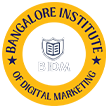
Digital Marketing as a Beginner: Fundamentals You Must Know
In today’s hyperconnected world, where people spend more time online than ever before, it is imperative to understand digital marketing. This holds for professionals, students, and even job seekers, as well as businesses. Whether you want to build your brand, launch a business, or grow your career, having a firm grasp of digital marketing fundamentals is the first step.
This guide will help you understand the core Fundamentals of digital marketing as a beginner, why it matters, and how you can start building your skills today.

What is digital marketing?
Digital marketing is the use of online channels like search engines, social media sites, email, websites, and mobile apps to promote products, services, or brands. Digital marketing uses the internet and digital devices to link companies with their target audience, in contrast to traditional marketing, which depends on TV commercials, billboards, or newspapers.
In simple words, digital marketing is marketing that happens online—where your customers already spend most of their time.
The Significance of Digital Marketing for Novices
Let’s examine why understanding digital marketing is essential before getting into the basics:
- Cost-Effective Marketing: Digital platforms enable companies to reach thousands of people at a fraction of the cost of traditional advertising.
- Greater Reach: With billions of people using the internet globally, digital marketing makes it simpler to grow internationally.
- Measurable Outcomes: Unlike print or television advertisements, digital campaigns can be monitored in real time with the help of Facebook Insights or Google Analytics.
- Career Opportunities: Digital marketing expertise is highly sought after in a variety of fields, including social media management, content production, SEO, and more.
- Scalability for Businesses: From start-ups to large corporations, digital marketing can adapt to the needs and size of any business.
The Core Fundamentals of Digital Marketing as a beginner
Now let’s break down the key pillars that form the foundation of digital marketing:
1. Search Engine Optimization (SEO)
Enhancing your website to rank higher in search engine results is known as SEO. SEO has an impact on the results that appear when someone searches for “best coffee shop near me” on Google.
Essential components of SEO include:
- Keyword Research: Identifying what your audience is searching for.
- On-Page SEO: Optimizing titles, meta descriptions, content, and images.
- Off-Page SEO: Building backlinks from trusted websites.
- Technical SEO: Improving website speed, mobile-friendliness, and security.
When done right, SEO helps drive free (organic) traffic to your website.
2. Content Marketing
The foundation of digital marketing is content. It refers to producing informative and entertaining content that appeals to and enlightens your target audience, such as blogs, videos, infographics, and podcasts.
Why it matters:
- Increases authority and trust in your field.
- Enhances SEO by focusing on pertinent keywords.
- Leads are nurtured by responding to enquiries from clients.
Prioritising quality over quantity is crucial for beginners. Create content that addresses issues or provides insights, rather than publishing content aimlessly every day.
3. Social Media Marketing
Businesses can establish direct connections with their audience through platforms such as Facebook, Instagram, LinkedIn, Twitter (X), and TikTok. To raise awareness, engage users, and increase traffic, social media marketers must create content specifically for each platform.
Beginner tips for social media success:
- Select the platforms where the majority of your audience is active.
- Post frequently, but pay attention to interaction rather than likes.
- To increase your exposure, utilize reels, stories, and relevant hashtags.
- Use sponsored advertisements to reach specific audiences.
4. Email Marketing
One of the best methods for fostering client relationships is still email marketing. It enables companies to send subscribers updates, newsletters, and special offers directly.
Why beginners should learn email marketing:
- High return on investment (ROI).
- Builds a foundation of loyal customers.
- Easy to automate using Mailchimp or HubSpot.
Remember: avoid spammy tactics. Focus on personalized, value-driven emails that people actually want to open.
5. Pay-Per-Click (PPC) Advertising
PPC is a type of paid advertising in which you are charged each time a user clicks on your advertisement. The two most popular platforms are Google Ads and Facebook Ads.
Why it’s powerful:
- Instant visibility on search engines or social feeds.
- Advanced targeting options like location, age, or interests.
- Works well for businesses that need quick results.
Beginners should start small, test campaigns, and optimize based on performance data.
6. Affiliate Marketing
Affiliate marketing allows you to earn commission by promoting other people’s products. Bloggers, influencers, and YouTubers often use affiliate links to generate passive income.
For businesses, it’s a cost-effective way to get others to market their products.
7. Analytics and Data Tracking
Data-driven decision-making is one of the most significant benefits of digital marketing. Google Analytics is one tool that marketers can use to measure:
- Traffic to websites and conversion rates
- Rates of bounce
- Demographics of customers
For beginners, learning how to analyze this data is essential for improving campaigns.
Steps to Get Started with Digital Marketing as a Beginner
Learning digital marketing might seem overwhelming at first, but breaking it into manageable steps makes it easier.
- Understand the Basics – Learn the fundamentals by taking free courses, watching tutorials, or reading blogs.
- Pick a Specialisation – Decide which area, such as content, social media, or SEO, to focus on first.
- Create Your Online Presence – To showcase your skills, consider creating a personal website or LinkedIn profile.
- Practice Consistently – Apply what you’ve learned by working on actual projects.
- Stay Updated – Since digital marketing trends shift quickly, it’s essential to continue learning and adjusting.
Common Mistakes Beginners Should Avoid
Beginners frequently make mistakes during the learning process, which may delay progress. Here are some things to be aware of:
- Ignoring SEO basics – Without SEO, your content may never reach your audience.
- Posting without a strategy – Social media requires a plan, not random posts.
- Overlooking analytics – Ignoring analytics. Understanding what’s working and what isn’t is made easier with data.
- Focusing only on sales – Build relationships first; sales will follow.
- Not being consistent – Digital marketing is a long-term game.
Future of Digital Marketing – Why You Should Learn Now
The digital world is changing quickly thanks to innovations like voice search, influencer marketing, AI-driven marketing, and personalisation. There are more opportunities than ever for experienced marketers as a result of businesses switching from traditional to digital budgets. By mastering the foundations now, you can position yourself for success and stay ahead of the curve.
Final Thoughts
Digital marketing isn’t just about selling—it’s about connecting with people online, building trust, and creating value. For beginners, the journey may seem challenging at first, but by mastering the fundamentals—SEO, content, social media, email, and paid advertising—you can unlock countless opportunities.
This introductory guide to the Fundamentals of Digital Marketing as a beginner is your first step towards success, regardless of whether you’re a professional improving your abilities, a student looking to pursue a career, or an entrepreneur expanding your company.



